6 'Based on a True Story' Movies with Unpleasant Epilogues

When Hollywood has exhausted its creativity producing prequels and sequels, it often turns to unbelievable real-life events for inspiration. Unfortunately, as we've pointed out twice before, many of these stories are total bullshit.
That doesn't mean every single one is fantasy -- in fact, some of the most notable "true life" movies are relatively factual. Unfortunately, however, these amazing stories often have terrible aftermaths that even Hollywood wouldn't dare to film.
Erin Brockovich's Firm Kept Millions That Could Have Gone to Victims

The Story You Saw: Erin Brockovich
Julia Roberts, venturing outside of her comfort zone by playing someone we're supposed to like, is Erin Brockovich, an unemployed and divorced mother of three. She gets a low-level job as a clerk at a law firm and devotes herself to standing up for the little guy.
With no legal training to speak of and a closet full of shirts that push her breasts out like they haven't paid rent in three months, she proceeds to bring a huge class-action lawsuit against major gas company PG&E for poisoning the water supply of Hinkley, California. Erin and her boss, Ed, work tirelessly to bring justice for the town's residents, and in the end, Brockovich wins $333 million for 648 residents and receives a $2 million bonus check.
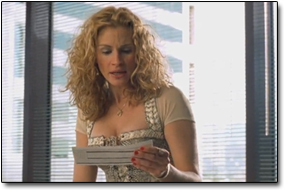
The Unpleasant Epilogue
As soon as she received that check, the real-life Brockovich became exactly like the film's rich-dick villains, only richer and dickier, like when Shredder turned into Super Shredder.
Instead of taking PG&E to court in full view of the public, Brockovich's firm convinced the residents of Hinkley to settle through private arbitration, where everything would be secret and the lawyers were basically accountable to nobody. After settling on the $333 million, the money wasn't given to the townspeople to pay for their medical bills until six months later. That's how long Erin's firm held onto the cash, giving the lawyers just enough time to have their way with each and every $100 bill.

When Hinkley's residents contacted Erin about their concerns ("concerns" is a term that here means "money for our cancer bills"), they found that their one-time advocate was now unreachable. Once they finally received the money, they noticed that it was far less than they expected. That's because the law firm, wanting more than the agreed-upon 40 percent of the settlement ($133 million), took an extra $10 million for "expenses."
Then, in an act that would make Satan himself issue a public apology, Brockovich's firm screwed the kids with cancer by taking a third of their settlements, even though it's an extraordinarily unusual and universally frowned upon practice to take more than 25 percent. Hinkley's residents also noticed that there was no rationale behind how much money each resident received, but the rules of private arbitration prevented them from finding out the formula used to determine the settlements.
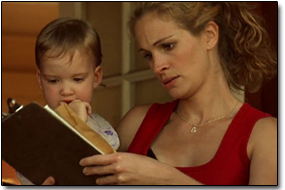
In the meantime, Brockovich has used the movie's portrayal of herself to launch successful careers as an environmental activist and motivational speaker, although we're assuming she leaves the whole "ripping off cancer patients" thing out.

Clubbing baby seals on her days off probably gets a mention, though.
The Moneyball Guy Gives His Formula to the Competition, Starts Losing

The Story You Saw: Moneyball
Billy Beane (Brad Pitt) is the brilliant general manager of the Oakland Athletics who hates every piece of furniture he comes into contact with.

"Fuuuuuuuck ..."
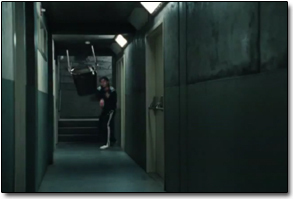
"... yoooooooou!"
Beane is tasked with assembling a winning team despite having the third-lowest payroll in the league. Realizing that he is totally screwed by every conventional definition of the term, Beane adopts a radical new method of evaluating players called sabermetrics, a system that values statistical analysis over the traditional practice of sitting around and deciding which guy looks best in uniform.

Ridiculed by industry professionals at every turn, the A's eventually prevail, winning 103 games during the regular season and earning a spot in the playoffs. Despite not making it to the World Series, Beane's fancy book-learning theories gain recognition for their genius and he flips over the entire inventory of an Office Depot in celebration.
The Unpleasant Epilogue
After the struggling Athletics made the playoffs three years in a row, other teams got suspicious and wanted to figure out exactly what Beane was up to. Evidently eager to help them out, Beane authorized the publication of a 288-page book, Moneyball, which provided some very specific details about Beane's thought process throughout the 2002 season. And by specific details, we mean it explained which statistics he thought were the most important and why, which players he liked and didn't like, his trading strategies and the ways he inflated the values of his players. It would be like Coca-Cola hand-delivering its secret formula to Pepsi, or the Weekly World News disclosing its investigative techniques to the CIA.

Not surprisingly, other teams began to use the same strategies outlined in the book. Nine teams hired sabermetric analysts following Moneyball's publication. This included not only poor teams that were looking to level the playing field, but also some of baseball's richest franchises, like the Mets, Red Sox and Yankees.

Predictably, the Athletics began to suck really fast, making the playoffs only once since 2003 and ranking among the worst in the league for the last five years. Despite this, their payroll actually increased and is now only the 10th worst in the league. Moneyball's author, Michael Lewis, has openly admitted that the book "probably cost the A's an opportunity or two," which is something that he maybe should have mentioned before the book was written.
Oskar Schindler Becomes a Failure

The Story You Saw: Schindler's List
Oskar Schindler, as played by Liam Neeson, is a money-obsessed industrialist in early 1940s Germany. His munitions factory is poised to make a killing using free Jewish labor when Schindler suddenly snaps out of the money-induced coma he's been in for the previous five years and realizes that his free work force is made up of real, actual human beings who are being exterminated by the Nazi regime.
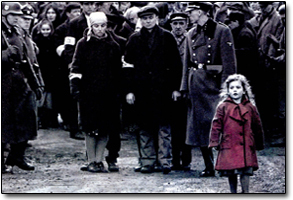
Schindler then does everything in his power to collect as many Jews as he can to work in his factories and keep them protected, including making friends with Lord Voldemort. By war's end, Schindler has saved over 1,000 Jews, has spent all of his money and is a shoe-in for sainthood on the first ballot. However, since he is ostensibly a member of the Nazi Party, Schindler is considered a war criminal by the Allies and is forced to flee to avoid capture, presumably in a van with Bradley Cooper and Quinton "Rampage" Jackson.
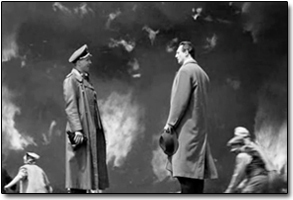
The Unpleasant Epilogue
OskarSchindler.com sensitively describes Schindler's post-war life as "a long series of failures," which might be the gentlest euphemism since your parents "took Barkley to the farm." Despite Schindler's remarkable feats, he was only known to the rest of the world as one of the many ex-Nazis who were not to be trusted. He was unemployed for a long time and survived solely on the care packages sent to him by the people he had saved.
Eventually he was given full welfare from the Joint Distribution Committee, a Jewish relief organization, and after receiving some not-too-pleasant love letters from embittered former Nazis, Schindler left for Buenos Aires to start a farm. He brought along his wife, some of the Jews he saved and his mistress, which must have been history's most awkward plane ride next to the one that carried home all the survivors of that rugby team from Alive.
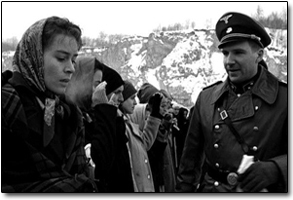
Growing crops and raising pigs proved too challenging for the man who fooled the most oppressive regime in history by running a munitions factory that never produced a single shell, and the farm quickly went bankrupt. Schindler packed his bags and flew back to Europe, stranding his wife and mistress in Argentina without so much as saying "Adios." In fact he never spoke to or saw his wife ever again.
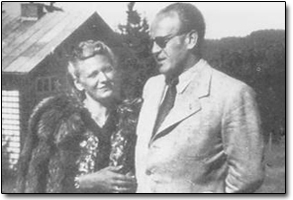
"I'm gone. Hook up with Mengele or something."
Back in Europe, Schindler tried to establish a cement factory, but that also went bankrupt. He continued to bum around like a hobo, surviving on nothing but donations and care packages from Jewish people, because telling Oskar Schindler to get his shit together would be like telling Gandhi to eat a McDouble.
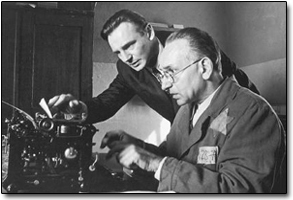
Don't take any of this to mean we're diminishing what he did during the war -- the sad epilogue in Schindler's life actually makes his heroism during the Holocaust all the more remarkable. This was not a particularly competent or driven or talented man -- he had no other successes to his name. But goddamn did the guy step up when the human race needed him to.
Jamie Escalante's Calculus Empire Comes Tumbling Down

The Story You Saw: Stand and Deliver
Jamie Escalante (played by Edward James Olmos) is a cockeyed, leather-faced optimist who thinks he can turn around Garfield High School, an academically troubled school in Los Angeles, by getting his students interested in math. After facing the standard resistance put up by high school students in an '80s movie led by the guy from La Bamba, Escalante eventually wins them over.

He teaches them advanced-placement calculus their senior year, and all of the students pass the rigorous AP exam, giving them access to a better future. When the Educational Testing Service calls bullshit, Escalante's students retake the test and destroy it a second time.
The Unpleasant Epilogue
Things at Garfield High went pretty well for a few years. Any student who could spell "AP" was allowed to take calculus with Escalante. Soon he and two other teachers had calculus classes with over 50 students, far past the 35-student limit set by the teacher's union. Escalante was faced with the choice of closing his open-door policy or allowing even more teachers in on a piece of the lucrative AP market. Neither of these appealed to him.

The premiere of Stand and Deliver in 1988 only made things worse. Escalante was soon receiving in-class visits from celebrities like President George H.W. Bush and then-actor Arnold Schwarzenegger. Evidently this drove the other teachers into such insane fits of jealousy that they wrote Escalante hate mail and threats.
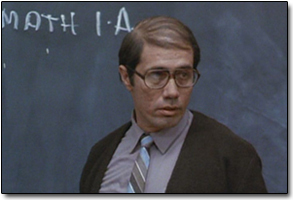
Escalante and another calculus teacher got fed up and left Garfield in 1991. Pretty soon the passing rate for the AP exam dropped into the single digits, and the school was worse off than before.
Julie Powell from Julie and Julia Writes About Her Twisted Sex Life

The Story You Saw: Julie and Julia
Julie Powell is a 20-something who helps families of September 11th victims claim their benefits. Naturally, this makes her feel that her life has no meaning, because all of her other friends are successful businesswomen. So to search for more purpose than helping those affected by 9/11, she decides to blog about cooking all 500+ recipes in famous chef Julia Child's cookbook.
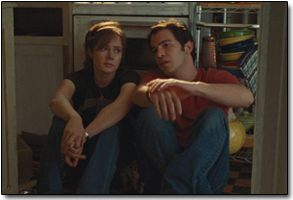
Julie's excessive devotion begins to cause concern among her friends and family. Even her super-supportive husband eventually gets fed up and leaves for a short while, which may be the first time in history a man has left a woman because she cooks too much food. Somehow Julie's blog gains traction, she mends her relationships with her husband and family and a literary agency decides to purchase the rights to her incredibly unremarkable story.

The Unpleasant Epilogue
As we saw above with Erin Brockovich, fame changes people. While Julie was portrayed in the movie as a spunky and relatable 20-something looking for meaning in her life, the real-life Julie changed quickly when her book was accepted for publication. Just before her book came out, Julie repaid her incredibly supportive husband by having an affair.
What separates this from your run of the mill "newly famous person goes though sexual partners like buffet items at Golden Corral" is that Julie at least had the decency to admit to her affair ... in her next book, Cleaving, a title that in this context suddenly sounds disturbingly sexual.
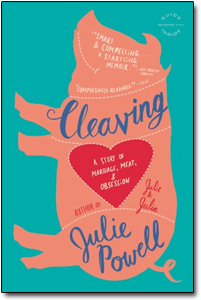
In the book, Julie goes on to disclose that another one of her hobbies is sadomasochism -- sex involving significant pain and/or humiliation. And who among us isn't immune to bouts of self-punishing sex with random strangers? Even her husband, Hollywood's depiction of an unrealistically supportive and perfect mate, doesn't survive the book unscathed. When he found out that his wife was having an affair, he decided to fight fire with fire and embarked on one of his own, which makes a sequel to Julie and Julia virtually a guarantee. And considering how popular super dark and gritty sequels have become, we will probably watch it.
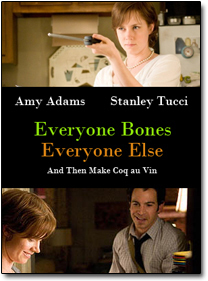
Stella's Impossible Love Story Turns Out to Be Impossible

The Story You Saw: How Stella Got Her Groove Back
Stella Payne is a 40-something stockbroker and divorced mother who doesn't have time for anything in her life but work. Convinced by her friends that she needs to relax, they all take a vacation to Jamaica. While there, a Jamaican native named Winston Shakespeare (go back and read that again -- this is actually his actual name) is attracted to Stella, and she falls for him despite the fact that he's only 20 years old and probably just looking for someone to touch his boner.

Shockingly, he's still interested in Stella after the two are intimate, and they develop a real connection.
Stella returns home, but she can't manage to get Winston off her mind. The two continue to correspond, and eventually Winston crashes a funeral to prove his love to Stella, because that's how you do that. In a completely unexpected turn of events for a romantic drama, the two lovers break up for a short while, but have a miraculous last-minute reconciliation at the airport and presumably live happily ever after.

The Unpleasant Epilogue
If we learned anything from How Stella Got Her Groove Back it's that a 20-year-old is capable of having a mature and fulfilling relationship that's not based on sex. This is still technically true for the real-life Stella, author Terry McMillan, who wrote the book on which the movie is based. See, her real-life Jamaican lover based their relationship not on sex, but on a love of getting the fuck out of Jamaica by any means possible, even if that meant faking interest in an American tourist twice his age.

That's what McMillan is alleging in court documents related to the couple's extremely bitter divorce. But that fact alone isn't why the couple is separating -- as it turns out, Jonathan Plumber, the real-life Winston Shakespeare, is actually gay, which explains the hot pink sleeveless shirts and all the dancing.

Plumber is firing back at McMillan, claiming that she's homophobic and trying to force him back to a tumultuous Jamaica as punishment. If that weren't enough, Plumber is also trying to take millions of dollars from McMillan by invalidating their prenuptial agreement, though to be fair she did earn most of that money from the book and subsequent movie based on their feigned relationship.

So if you're a middle-aged lady on vacation in a foreign land and you get approached by a striking young local, just know that he possibly sees you as nothing more than a green card dispenser, especially if you look like you and he looks like Taye Diggs.
Michael Cooney can be contacted at Mikey.Cooney@gmail.com. He writes articles and sketch comedy.
For more stories we're glad Hollywood didn't tell, check out 6 Movies Based on a True Story (That Are Also Full of Shit). Or check out some stories that should definitely get the blockbuster treatment in 5 Soldiers Whose Horrific Injuries Only Made Them Angry.
And stop by LinkSTORM to see the happy-go-lucky beginnings of SWAIMbot (that are actually grotesque and frightening).
And don't forget to follow us on Facebook and Twitter to get sexy, sexy jokes sent straight to your news feed.
Do you have an idea in mind that would make a great article? Then sign up for our writers workshop! Do you possess expert skills in image creation and manipulation? Mediocre? Even rudimentary? Are you frightened by MS Paint and simply have a funny idea? You can create an infographic and you could be on the front page of Cracked.com tomorrow!